The flying Dutchman
Posted by wordsurfer
So many things to write about. So many ideas. So little time. I’ve been writing blog posts in my head for weeks, yet never seem to be able to remember them when I sit down to write. Today, though, my brain has picked up another of its frequent obsessions (see my brain on obsession) and I have to write about it. There’s no choice involved here – I’m being compelled. By my own imagination. It’s weird and beautiful, both at the same time.
Alright, here goes:
The Flying Dutchman – a romantic opera in three acts. Written by Richard Wagner, first performed in 1843 in Dresden. I saw it last night on TV (‘it’ meaning the most recent production at the Zürich Opera, as filmed by the French/German channel “arte”, one of our very best TV stations).
I don’t know much about classical music and I can count the times I’ve listened to a whole opera on my hands. Yet last night, after watching and listening to this opera, I went and researched it (wikipedia = source of all knowledge), then went to sleep and dreamed about it, then woke with one of the songs in my head this morning and while I walked the dog, I talked to myself while recording my voice as I sometimes do when I go walking, and ended up with a thirty-minute, in-depth analysis of the whole thing, without even meaning to. It just poured out. (Don’t worry, I’m not going to go into that!)
So, what’s going on here? Why have I suddenly become obsessive about this, to the extent of trailing youtube for interviews with the leading singers of last’s night performance and listening to their takes on the characters? It’s the story. It’s good. It’s also open to several layers of interpretation. Plus, there was a lot of intensity and passion at play on that stage and I can’t resist that combination.
In one way, the story is really simple: Daland, a Norwegian seafarer, has to take refuge in a bay from a storm, very close to home on his way back there. When the storm is over, they see that another ship has taken refuge there, and call out to the captain, who is the Dutchman. He has been cursed, through his own fault, to sail the seven seas to all eternity without the release of death. However, every seven years he is allowed to go on land and try to find a loyal wife who will love none but him. If he finds a girl who will be true to him until her death, he is released. If the girl betrays him, she is doomed to eternal damnation, just like him. So far, all the girls have fallen and the Dutchman (and his crew, by the way) are suffering the agony of eternal wanderings.
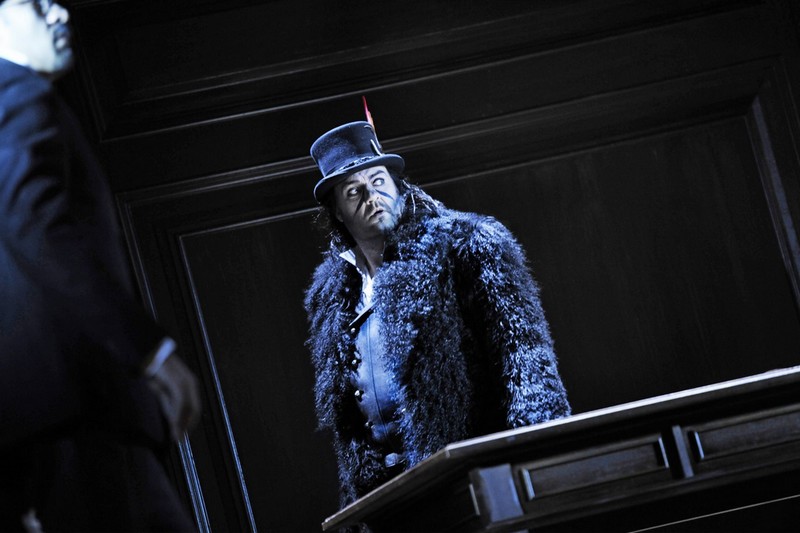
the Dutchman (Bryn Terfel) appears on the ship
(image copyright Toni Suter / T + T Fotografie)
The Dutchman asks Daland to give him shelter in his house for the night and offers unimaginable treasures for the privilege, and then asks if Daland has a daughter and after some further exchanges between the two men, asks for her hand. Daland agrees because he cannot refuse the treasures that the Dutchman offers.
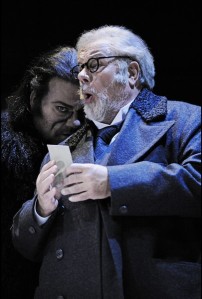
Daland (Matti Salminen) and the Dutchman look at Senta’s picture
(image copyright Toni Suter / T + T Fotografie)
The second act takes place in Daland’s house, where the servant girls are busy spinning (or typing, as in last night’s production) and Senta, Daland’s daughter, who is supposed to work with them and sing their song with them, refuses to do so, instead gazing at a picture all the time. Some raillery ensues, the girls tease her that Erik, the hunter, is hot-blooded and might shoot the picture from the wall in jealousy.
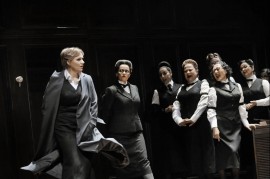
Senta (Anja Kampe) refuses to join the girls in their work
(image copyright Toni Suter / T + T Fotografie)
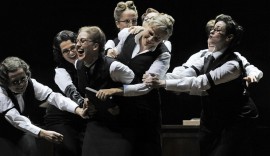
the girls tease Senta about the picture of “the pale man”
(image copyright Toni Suter / T + T Fotografie)
.
.
.
.
.
.
.
.
.
Senta asks her nurse to tell her the story of the “pale man” once more, but when the nurse refuses, she herself tells the servant girls the story of the flying Dutchman, and it becomes apparent that she is deeply touched by it, and in the end, she even says that she will be the one to release him, if only he knew and could come to her. Then there’s some more chit-chat between the girls and an interlude with Erik, who is hoping to become her fiancee and who she seems to have been in love with before, and he tells her of a terrible dream he had, where she was in the arms of a “devil” who took her out to sea. He is desperate about it, she is becoming more and more aroused and excited and then, of course, the two ships appear and the people alight.
Senta and the Dutchman meet and it’s love at first sight for both of them, she swears to be loyal to him and when her father appears, she tells it to all the household.
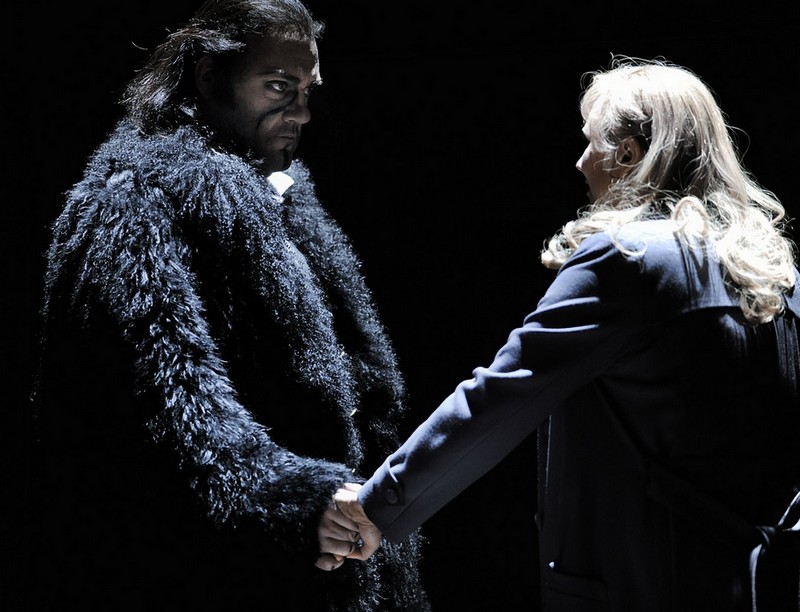
the first meeting
(image copyright Toni Suter / T + T Fotografie)
Erik, of course, makes a scene, almost pleading with her to see that she is caught in a spell, caught in a trap, that he truly loves her and didn’t she give her hand to him? She is startled and denies it quickly, but he reminds her of their shared past, and she is frightened but also sorry for his pain.
The Dutchman, who has heard this interchange, then appears and pushes her away from him, saying that she might have given her hand to him, but she has not yet done so in front of the Almighty, and that will save her, because obviously, she cannot be loyal. She is desperately trying to make him understand that she will be loyal to him, but he doubts her and wishes to save her from damnation, so he enters his ship again, accepting that there will never be relief for him until the Day of Judgment arrives. Senta is desperate, proclaims once more that she gives him his hand and is loyal to him until death, then picks up Erik’s gun and shoots herself.
That’s it. Roughly.
The end came really quickly and I was confused whether her sacrifice is enough to release the Dutchman, but according to Wagner, it is. In one version, the ship is seen to sink the moment Senta throws herself off the cliff (as directed by Wagner). So Senta succeeds in releasing him – then why is this called a tragic ending? The Dutchman is released. Senta is dead, sure, but she did what she wanted to do and she goes straight to heaven, her soul is saved (which is a big deal for her and for her society). For me, that’s not a tragic ending.
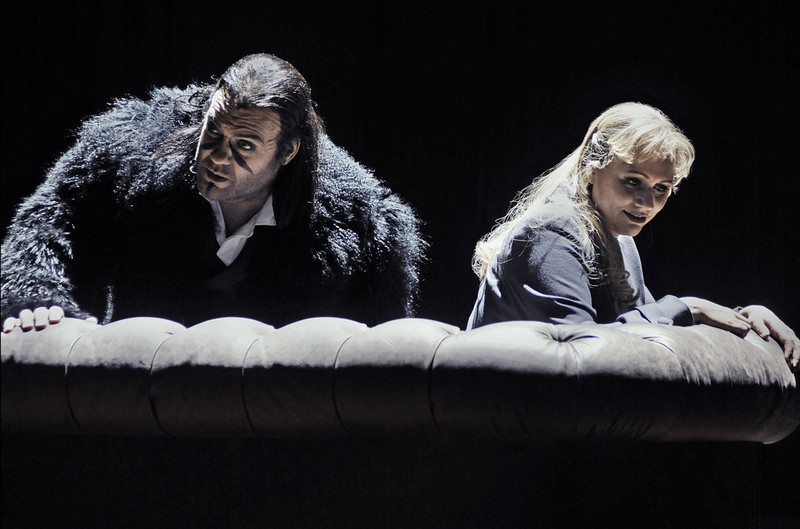
the Dutchman and Senta, overwhelmed by their feelings
(image copyright Toni Suter / T + T Fotografie)
Some things I really like about this opera:
- The scene where the two first meet… It’s full of passion and yearning and hope. Two souls meet, each recognizing itself in the other. The Dutchman is caught in the curse, destined to never find home, to never find peace. Senta is caught in her home, in conventions and expectations and mediocrity. Both long for freedom. She, for the freedom of romance and feeling and ecstasy and choosing her own path. He, for the freedom of peace and security and release from the agony of eternity.
- That very well observed passion that (some) women have of thinking that they will the salvation of a man. Senta gives her own life and future to release the man she loves. It’s a grand gesture, and it’s also the gesture of a very young, very romantic woman, the woman who is glad to suffer, happy in agony, because it will save a man. Considering that this was written by a man, I think he got that aspect very well.
- That despite his centuries of searching for salvation and his ardent wish to have it all end and to finally die, the Dutchman, an un-dead person if ever there was one, thinks only of Senta when he fears that she will not be able to be loyal and chooses his curse with eyes open, to save her from damnation. How romantic!
- What Wagner said about their love: that they did not fail because of the world, but rather, the world failed because of them. I had to think about this one a bit, but I understand what he meant.
And because I could go on talking, but have already done so for long enough, I’ll give you the link to the program, where you can watch the whole of the third act online. It’s in German, of course, but if you’re only the least little bit intrigued by what I’ve said so far, watch the first ten minutes of it – the video starts at the point where Senta and the Dutchman meet and even if you don’t understand the words, the acting is superb and you can see and hear all you need to understand what’s going on with these two. Also, in these scene I switched from thinking ‘Oh my god, she can’t actually be in love with an undead damned man?’ to thinking ‘You know what, I can see her point…’. And also: ‘Wow, they do really real kissing on stage there! Wait a second – are they using tongues?!?’ – Okay, I’ll admit, that last bit is somewhat beside the point. But I did wonder. Have a look yourself.
Wagner: Der fliegende Holländer (The flying Dutchman) on arte
And if that is not enough, here’s an interview with Bryn Terfel, who plays the role of the Dutchman. It’s in English and I really like it, he comes across as a really cool, down-to-earth and intelligent man with a good insight into this opera.
About wordsurfer
writer, ex-teacher, human rights believer & fighter, traveller, adventure-seeker, freedom lover, global citizen. big on daydreams, less so on reality.Posted on May 13, 2013, in day-to-day and tagged Anja Kampe, arte, Bryn Terfel, classical music, Der fliegende Holländer, music, obsession, opera, The flying Dutchman, Zürich. Bookmark the permalink. Leave a comment.
Leave a comment
Comments 0